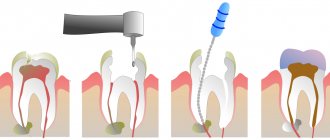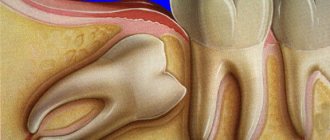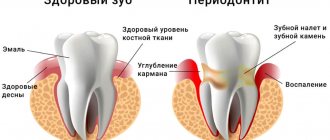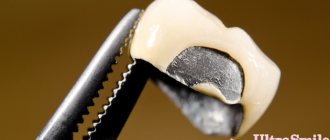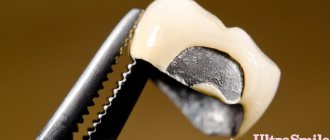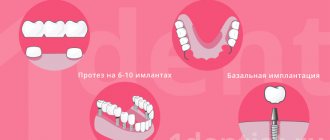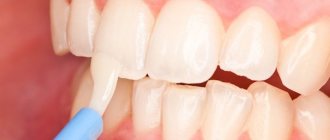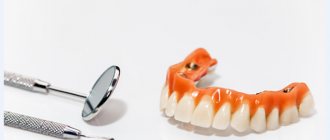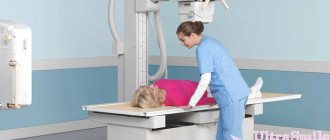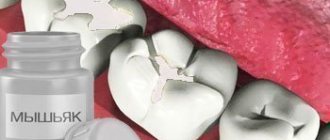Swallowed a tooth crown, how long will it come out?
Swallowed a tooth crown.
A dental crown, no matter what material it is made of, has a certain service life.
Even if, according to the manufacturer, it is quite long, thanks to the material and manufacturing technology of the structure, it is still limited.
Replacement or re-installation of crowns must be carried out approximately every 10 years, otherwise you can inevitably join the list of people who frantically search on the Internet for an answer to the question: “I swallowed a tooth crown, what should I do?”
What complications may arise?
It is necessary to understand the danger of a crown getting into the human digestive tract.
The materials from which dental structures are made are non-toxic.
But chips and sharp edges can cause unpleasant consequences.
Therefore, if a crown has been swallowed partially or entirely, you should immediately contact a gastroenterologist, surgeon, or at least the nearest emergency room.
The danger of this situation is that if foreign bodies enter the digestive tract, complications such as:
- Perforation (perforation) of the wall of the digestive tract.
- Bleeding caused by injury to the walls of the digestive system.
- Intestinal obstruction.
If relief measures are not taken in time, the outcome can be fatal.
Is it possible to carry out professional hygiene with crowns?
Both teeth and any dentures require high-quality hygiene. Once or twice a year, have your teeth cleaned with an ultrasound. But Air Flow is prohibited in the presence of multiple crowns, since the drug contains abrasive particles that can damage the smooth surface of the dentures. In such a situation, you should definitely warn the doctor about the presence of crowns or bridges - if there are few of them, you can simply bypass them and carry out Air Flow cleaning in another area.
Clinical cases
- While eating, the patient accidentally swallowed a crown that was held in place with temporary cement after three weeks of use. She consulted a doctor, and after the examination the patient’s condition was brought under control.
- Two hours after visiting the dentist, the patient swallowed a crown that was fixed to the implant. During the X-ray examination, it turned out that the structure was located in the small intestine. The patient was advised to wait for the crown to come out naturally.
- After a month ago the patient swallowed a crown with a pin and it still did not come out, he returned to the doctor. The man had several photographs in his hands that indicated the location of the structure. All the time, the patient was observed by a surgeon, who rightly chose a wait-and-see approach. Analyzes, survey photographs to determine the movement of the structure and other necessary examinations were carried out regularly. A special diet, laxatives, and enemas were prescribed. There was no result. According to the last image, the crown remained in the same place. Since at the time of treatment the patient complained of stabbing pain in the right iliac region, worsening after eating, a decision was made to perform surgical intervention.
Video: “Dental crowns in dentistry”"
What happens if you swallow a tooth: possible complications and competent help.
The use of special dentures can eliminate dental problems.
However, in some cases, unpleasant situations are possible in which a person swallows a denture, pin or crown.
You need to know what will happen if you swallow a tooth and where to turn for help.
The use of parts to restore a damaged tooth allows you to eliminate the defect. But there are situations when dental prostheses or the tooth itself are swallowed. The reasons are mainly as follows:
- Swallowing a tooth occurs as a result of a violation of its integrity, for example, during a meal.
- Prosthesis - ingestion occurs when the part becomes loose. Failure to promptly contact the dentist can lead to loss of the denture while eating hard foods.
- Pin – entry into the digestive tract of a pin occurs rarely and is mainly as a result of poor-quality installation of a denture. The prosthesis falls out along with the pin; it can be swallowed with food.
- Crown - the installation of a crown occurs using special means for fastening; in some cases, the crown falls off and is swallowed. Most often, such unpleasant symptoms occur at night.
Tip #1: Don't panic
Often people can involuntarily swallow a fragment of the crown while eating, while chewing it, for example, with meat or even with tomatoes (i.e. with soft food), or trouble can happen in their sleep. If such a situation occurs in your life, then try not to panic. Indeed, in most cases this is not fraught with serious complications. Modern artificial crowns and dentures are made of safe and hypoallergenic materials, i.e. At least you won’t get poisoned, and your body won’t become intoxicated. If you swallowed the crown part of a natural decayed tooth that broke off, then the situation is similar.
It is important not to panic if the product is swallowed
“In general, such an unpleasant situation can only happen in a few cases. For example, if the service life of the prosthesis itself and the cement with which it was secured has expired, i.e. the structure simply disintegrated. Or the doctor initially used low-quality materials and adhesives for fixation in his work. This often happens with temporary structures that are not intended for cement fixation and long-term use. Well, sometimes the reason may lie in the fact that the patient himself puts an unbearable and completely inadequate load on a natural or artificial tooth; he likes to chew nuts, crackers, and open bottles. Also, the cause can be any injury received during an accident, a fall, a fight, or playing dangerous sports,” says Ambalova E.I., dental therapist, orthopedist.
Consequences
You need to understand what will happen if you swallow a piece or splinter of a tooth. Some complications may occur that harm both the adult and the child.
If a temporary filling with arsenic is swallowed, there is virtually no risk of poisoning: dentistry uses a special paste that contains a small amount of the toxic substance.
Ingestion of arsenic during childhood can in some cases provoke symptoms of nausea; if such symptoms occur, you should consult your pediatrician.
Comments
I have a crown on a post. If I suddenly accidentally swallow it along with the pin, how dangerous will it be?
Alexey (03/09/2019 at 21:40) Reply to comment
- Dear Alexey. Swallowing a pin is a very rare and dangerous situation. This can only happen if the dentist did a poor job installing it. If such a situation does occur, then it will be necessary to take an x-ray and get an emergency consultation with a gastroenterologist, because the consequences can be tragic - damage to the walls of the stomach and intestines, internal bleeding. Most often, to remove the pin, doctors resort to surgery, i.e. perform a surgical operation.
Editorial staff of the portal UltraSmile.ru (03/11/2019 at 09:11) Reply to comment
My son had a temporary filling with arsenic placed on Friday, and he swallowed it on Saturday. We won't be able to see the doctor until Monday. What to do and why is it dangerous?
Victoria Kalinina (03/17/2019 at 11:47 am) Reply to comment
- Dear Victoria. Modern arsenic pastes contain small amounts of toxins and are quite safe, and their dosage is too minimal to cause significant harm to the body. But in some cases, arsenic can cause poisoning and intoxication of the body, nausea and vomiting, and allergic reactions in a child. Therefore, it is recommended to rinse the stomach, give the child sorbents and antihistamines, and carefully monitor his condition. If necessary, call an ambulance or consult a pediatrician on Monday.
Editorial staff of the portal UltraSmile.ru (03/24/2019 at 09:18) Reply to comment
Does it make a difference what you swallowed: a piece of a natural tooth or an artificial crown?
Vlasov Yu.V. (04/12/2019 at 16:13) Reply to comment
- There is practically no difference, the consequences can be similar. But some experts believe that a swallowed piece of a natural tooth will not cause any complications in 100% of cases, but artificial material may be incompatible with the body and its swallowing is often fraught with unpleasant consequences.
Editorial staff of the portal UltraSmile.ru (04/15/2019 at 08:57) Reply to comment
My child swallowed a baby tooth two days ago and feels great, but for some reason nothing comes out naturally. When is it time to start worrying?
Alina (04/28/2019 at 15:04) Reply to comment
- Dear Alina, let your child eat more solid vegetables and fruits, whole grains, and drink warm water and milk more often. If the problem is not resolved within 4-7 days, then to completely remove the issue and calm down, contact your pediatrician.
Editorial staff of the portal UltraSmile.ru (05/04/2019 at 11:02) Reply to comment
I, 10/22/20, swallowed a dental bridge of 7 teeth along with food. A painful state, now everything is behind them. 02.11.20 they left.
Natalya (11/02/2020 at 12:40 pm) Reply to comment
Write your comment Cancel reply
Doctor's actions
If a foreign body causes discomfort after swallowing, you should consult a gastroenterologist. The specialist will interview the patient to identify the type of foreign body and its size. After which the following procedures are prescribed:
- X-ray examination to identify the location of a foreign body;
- gastric lavage;
- enema (if the object is located in the intestines);
- use of an esophagoscope - prescribed in difficult cases when a pin is swallowed (a foreign body is removed using the device under anesthesia).
After removing the foreign particle with a special device, you need to be observed by a specialist for some time to diagnose damage to the digestive organs.
When do swallowed objects leave the body?
The time it takes for dentures to leave the digestive tract depends on the individual characteristics of the body. Most often this takes several days.
The crown can leave the body for up to 4 days.
What to do if you swallow a dental crown?
With a steel or gold crown, the gingival margin is, by definition, always sharp. The thickness of the metal from which crowns are made is 0.25 hundredths of a millimeter; after annealing, bleaching and polishing, only 0.2 tenths remains, and dental technicians must chamfer the gingival edge, and when you hold such a crown in your hands while polishing, the skin on your fingers You can cut it lightly.
But in my long practice, I have never heard that someone’s intestines or stomach were damaged by a swallowed metal crown. They all exit naturally through the anus. Usually in two or three days.
If the crown is from chewing teeth, it generally resembles a cube:
In the upper front teeth, there is subsidence of the gums on the vestibular or lingual side, especially in the canines. Here you can still be wary, because the edges of the crown will be pointed.
If it doesn’t come out quickly or some painful symptoms appear in the abdominal area, then you will have to go to the doctors, have an x-ray done, monitor the movement of the crown and, if indicated, undergo surgery.
But I repeat, in my memory this has never happened, people swallow bridges and they come out safely. What about the bridges, the stars from the shoulder straps are swallowed with splayed ends and nothing. )
Causes of crown loss
In modern dentistry, high-quality materials are used for dental prosthetics, but we should not forget that the crown remains not a natural tooth, but a special design. It consists of the body itself, simulating a tooth, a pin for fastening, and a cementing material.
The latter must be of high quality , applied in accordance with technology and in sufficient quantity. If at least one of these conditions is not met, instead of the 5-10 years guaranteed by the doctor, the crown will last no more than a year.
Dental crown
The success of the procedure largely depends on how accurately and correctly the doctor performed the preparatory procedures:
What to do if you swallow a tooth crown
When a crown falls out, it is often swallowed, especially if the incident happened at night. No need to worry: the prosthesis is made from non-toxic materials, so poisoning will not occur. However, you still need to quickly seek medical help.
Promptly contact a specialist
Usually the crown falls out without a pin, but if it is also swallowed, complications are possible , because it is made of durable metal. It is difficult for the human body to digest such material. There is also a danger from a crown that has broken off under mechanical stress, that is, it has crumbled, forming sharp edges.
X-ray (survey) of the abdominal cavity
In any case, to refute or confirm this, you should immediately go to the doctor. If there is bleeding in the oral cavity, you should call an ambulance so that prompt assistance can be provided in case of damage to the digestive tract.
The doctor refers the patient for an x-ray examination . It allows you to identify the location of the swallowed crown and evaluate its shape: whether it has sharp edges and whether it poses a danger to human health. The doctor decides on the need for gastric lavage or gives an approximate time frame for the passage of a foreign body through the intestines naturally.
Gastric lavage
At the slightest suspicion of possible damage to the stomach or in case of obstruction of a foreign body, it is advised to perform lavage as soon as possible. For this, use a solution of furatsilin or another neutral agent. In rare cases, if the prosthesis reaches the intestines but does not come out, an enema with distilled water is used.
Esophagoscope
If the above methods do not help, resort to surgical removal of the crown using an esophagoscope . This flexible instrument is inserted under local anesthesia, the process is accompanied by tracheal intubation. Using video monitoring and special narrow forceps, the doctor first removes the crown, then the device itself.
After surgery, control contrast radiography is required. This procedure will allow you to identify signs of damage to the walls of the esophagus and prescribe treatment in a timely manner. So, for damage up to 0.5 cm in diameter, antibiotic therapy and rinsing are sufficient - the mucous membrane will recover within a few days.
What to do if a denture is swallowed
Most unpleasant situations occur during sleep or while eating. The main rule is not to panic and not to try to prescribe laxatives on your own. It is necessary to urgently consult a doctor to find the safest and most comfortable solution. Most modern prostheses are made from high-quality materials, so poisoning and intoxication are excluded.
But the problem should not be ignored: old crowns may have sharp chips or break when chewed. When they enter the esophagus, they easily injure thin walls and mucous membranes. This can provoke inflammation with a number of complications that are difficult to treat. Therefore, you cannot do without visiting the emergency room or surgeon.
How long to wait for the prosthesis to come out naturally?
If a woman swallows a denture, in most cases doctors recommend waiting for it to be excreted in the feces. Each patient’s body and intestines “work” individually, so complete passage through the tract can take up to 7 days.
Read Structural materials for dentures - metal alloys, plastic, vinyl
What dentures are most often swallowed in a dream?
Among the structures that can be swallowed unnoticed:
- crowns with broken fastening;
- “butterfly” for one tooth made of nylon;
- bridge for 2–3 teeth;
- artificial tooth with a pin.
The problem is relevant for patients of all ages. It often occurs in people after a stroke, when sensitivity is lost.
Causes of structures falling out
Despite the use of high-quality materials, situations arise in which a dental crown is swallowed:
- fastening technology is broken;
- the crown decemented after the expiration date;
- clasps broke;
- the pins have become loose.
Sometimes the problem occurs after prosthetics, when the denture still causes discomfort and the patient has poor control over its position.
Consequences
In most cases, if a person swallows a denture, it will come out on its own within a few days. But there is always a risk of damage to the walls of the esophagus. The edges of the crown can damage the mucous membranes and cause bacterial infection.
How long will it take for the prosthesis to come out naturally?
If the doctor, using an x-ray examination, has determined that the swallowed prosthesis does not pose a danger, the patient can only wait. and the foreign body should come out naturally. This time may vary depending on the characteristics of a particular organism, proper nutrition, and the presence of chronic diseases of the digestive system.
If after the specified period of time the crown has not come out, it is worth undergoing a repeat X-ray examination. This will ensure that the object is not stuck and is moving through the intestines.
Tip #5: Make an appointment with your dentist
The dentist will help you restore the damage and restore the beauty and functionality of your tooth. But here it is important to take into account that if the artificial crown has been swallowed completely or a large part of it is missing, then it will have to be completely replaced, because In this case, it will be simply impossible to restore the structure. If the top layer has chipped, for example, the crown was made of metal-ceramics or ceramics, and a small piece of ceramic has fallen off, then the doctor will carry out the restoration right at the appointment.
A chip in the upper can be corrected by restoration without removing the crown.
Similarly, a crown will have to be installed on a decayed natural tooth, or, depending on the scale of the destruction, it will be possible to get away with either a composite build-up, or the tooth will have to be built up first using a pin or stump tab.
In general, be sure to visit the dentist every six months. After all, then a specialist will be able to identify the problem in time during a preventive examination and eliminate it before an unpleasant situation associated with swallowing a crown occurs to you. If you ignore going to the doctor, then you simply may not notice, for example, that a tooth has become loose or needs restoration, or that an artificial crown has already expired or needs to be replaced.
Notice
: Undefined variable: post_id in
/home/c/ch75405/public_html/wp-content/themes/UltraSmile/single-item.php
on line
45 Notice
: Undefined variable: full in
/home/c/ch75405/public_html/wp-content /themes/UltraSmile/single-item.php
on line
46
Rate this article:
( 4 ratings, average: 4.75 out of 5)
crown
Possible complications
The loss of a denture causes the appearance of an open wound or unprotected area in its place. Bacteria get there with food and lead to infection. Therefore, when breaking off a crown, it is necessary to rinse the resulting cavity with a disinfectant solution, for example, chlorhexidine, to avoid infection. Next, you need to consult a doctor who will promptly close the wound using temporary materials.
If a dental crown gets into the digestive organs, it can cause problems in their functioning. Sometimes a foreign body causes intestinal disorders, vomiting, and nausea. If you managed to get the swallowed object naturally, then possible symptoms will stop bothering the person almost immediately.
If the crown damages the walls of the esophagus or stomach, the following signs are observed:
- bleeding from the mouth;
- pain when swallowing;
- nausea;
- body temperature rises to 39 °C;
- painful sensations when turning the neck or torso.
This leads to the development of peritonitis, internal bleeding, and intestinal obstruction. In the absence of timely assistance within several days, death from blood loss and general exhaustion of the body cannot be ruled out.
How to properly brush teeth with dentures
The presence of crowns, inlays or dental bridges in your mouth should not embarrass you: you need to care for them and all other teeth in the same way as you did before:
- it is necessary to clean the oral cavity of plaque 2 times a day - morning and evening: using a toothbrush, make vertical movements from the gums to the cutting edge of the tooth, you can supplement such procedures with an irrigator,
- After each meal, you must use an irrigator, dental floss and interdental brushes (as indicated and with caution). Or at least rinse your mouth with a special product, or with regular warm water.
In addition to the restored teeth, living teeth and gums remained in the oral cavity. They need to be looked after, otherwise the risk of their premature loss increases. Remember that gum disease is five times more likely to lead to tooth loss than regular tooth decay and its consequences.
